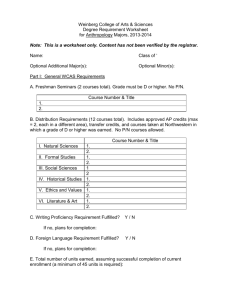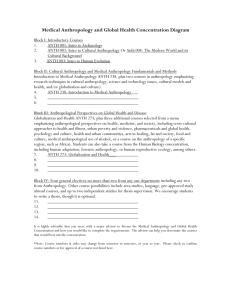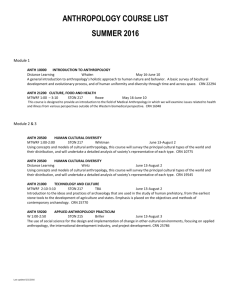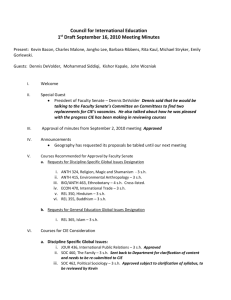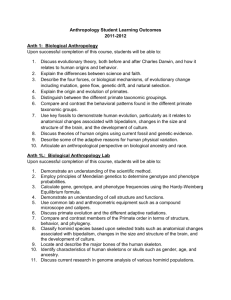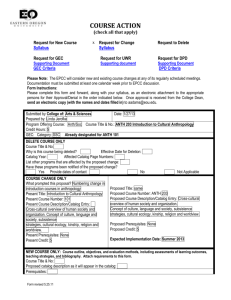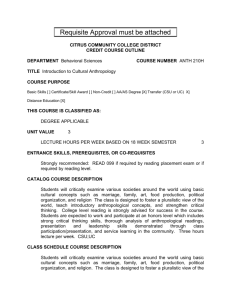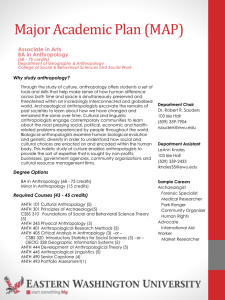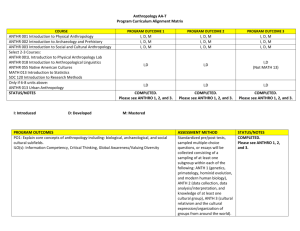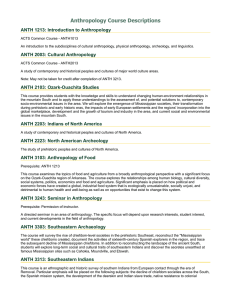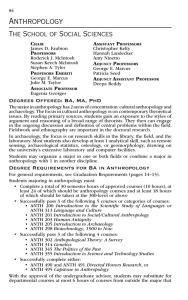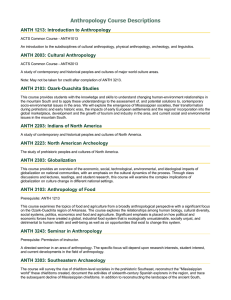Course Requirements - Eastern Oregon University
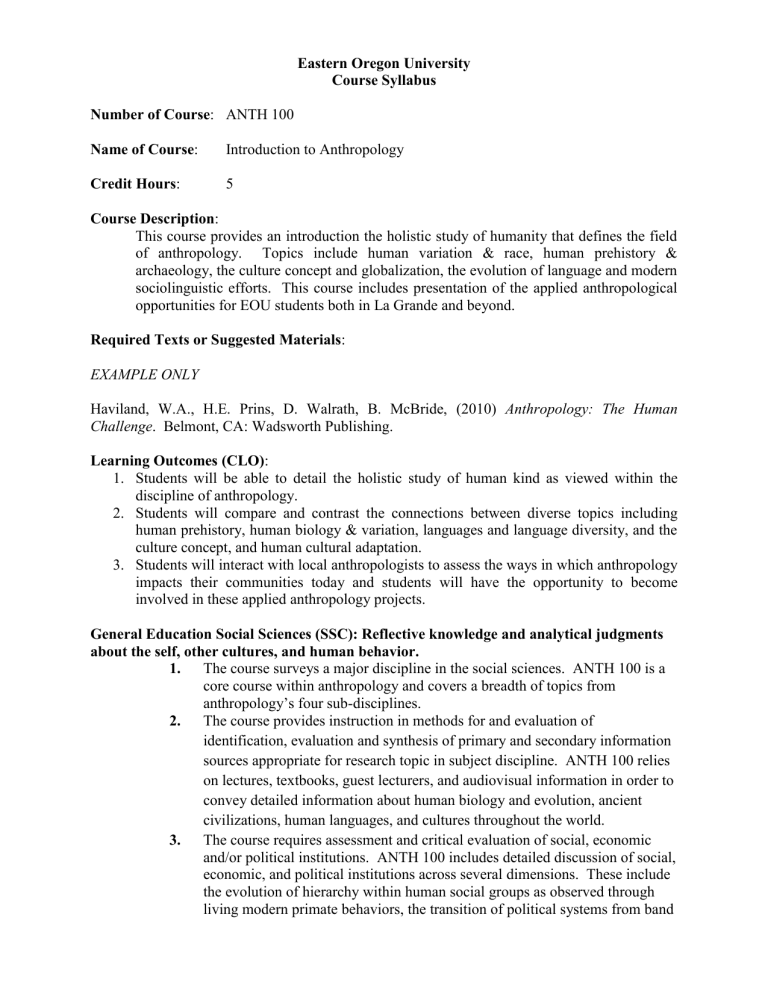
Number of Course : ANTH 100
Eastern Oregon University
Course Syllabus
Name of Course : Introduction to Anthropology
Credit Hours :
Course Description :
5
This course provides an introduction the holistic study of humanity that defines the field of anthropology. Topics include human variation & race, human prehistory & archaeology, the culture concept and globalization, the evolution of language and modern sociolinguistic efforts. This course includes presentation of the applied anthropological opportunities for EOU students both in La Grande and beyond.
Required Texts or Suggested Materials :
EXAMPLE ONLY
Haviland, W.A., H.E. Prins, D. Walrath, B. McBride, (2010) Anthropology: The Human
Challenge . Belmont, CA: Wadsworth Publishing.
Learning Outcomes (CLO) :
1.
Students will be able to detail the holistic study of human kind as viewed within the discipline of anthropology.
2.
Students will compare and contrast the connections between diverse topics including human prehistory, human biology & variation, languages and language diversity, and the culture concept, and human cultural adaptation.
3.
Students will interact with local anthropologists to assess the ways in which anthropology impacts their communities today and students will have the opportunity to become involved in these applied anthropology projects.
General Education Social Sciences (SSC): Reflective knowledge and analytical judgments about the self, other cultures, and human behavior.
1.
The course surveys a major discipline in the social sciences. ANTH 100 is a core course within anthropology and covers a breadth of topics from anthropology’s four sub-disciplines.
2.
The course provides instruction in methods for and evaluation of identification, evaluation and synthesis of primary and secondary information sources appropriate for research topic in subject discipline. ANTH 100 relies on lectures, textbooks, guest lecturers, and audiovisual information in order to convey detailed information about human biology and evolution, ancient civilizations, human languages, and cultures throughout the world.
3.
The course requires assessment and critical evaluation of social, economic and/or political institutions. ANTH 100 includes detailed discussion of social, economic, and political institutions across several dimensions. These include the evolution of hierarchy within human social groups as observed through living modern primate behaviors, the transition of political systems from band
ANTH 100, Pg 2 level egalitarians through state level societies, and the intersection of these areas as seen in modern anthropological studies of globalization.
4.
The course requires students to make compelling and reasoned arguments based upon appropriate evidence in written and/or oral format specific to the discipline. ANTH 100 students write a series of reaction papers and/or participate in oral presentations/debates about controversial topics within the discipline such as The Race Concept (do human races exits?), cannibalism in the American southwest, the rapid disappearance of many Native American languages today, and cultural/ethnic conflict that has developed with a globalizing world.
5.
Critical Thinking is the intellectual skill that supports the Content Knowledge category identified for ANTH 100. The controversial topics discussed in the course cross-cut a wide range of academic disciplines. The Reaction Papers and discussions assigned in the course require students to both critically assess the information presented and process that information in formulating their own, informed opinion on a variety of topics related to several social science disciplines.
Means of Assessment :
300 points Exams
100 points Reaction papers and discussion on debated topics
400 points Total points
Grading Scale:
94-100 A
90-93 A-
87-89
84-86
B+
B
Course Requirements :
Exams: (CLO 1,2)
80-83
77-79
74-76
70-73
B-
C+
C
C-
67-69
64-66
60-63
0-59
D+
D
D-
F
There are three exams, each worth 100 points. The exams are a combination of multiple choice, true/false, short answer, and essay questions. Exams are scheduled for 50 minutes.
Reaction Papers: (CLO 1,3)
There are many debated topics with the study of all of humanity. You will choose from a selection of controversial topics within the field of anthropology which could include the race concept, cannibalism, the Neandertal speech debate, Native language programs, and many others. Your paper must be two pages minimum (500 words). You can find the reaction paper rubric in Course Documents within the Blackboard shell for the class. All papers must be in 12point type and double-spaced. Make sure to include your name, date and class on all papers.
Please submit all your papers through the assignment link in Blackboard.
Brief Outline of Course:
Week 1: Introduction to Anthropology
ANTH 100, Pg 3
Week 2:
Week 3:
Week 4:
Week 5:
Week 6:
Week 7:
Week 8:
Week 9:
Physical Anth: Human Evolution
Physical Anth: Human Biological Variation & Race
Archaeology: Ancient Civilizations
Archaeology: What Old Garbage tells us about the Future
Cultural Anth: What is Culture?
Cultural Anth: Kinship, Marriage, & Gender
Linguistics: The Evolution of Human Languages
Linguistics: Sociolinguistics
Week 10: Applied Anthropology
FINALS WEEK: Final Exam
University Writing Requirement Outcomes : N/A
Statement on Academic Misconduct :
Eastern Oregon University places a high value upon the integrity of its student scholars. Any student found guilty of an act of academic misconduct (including, but not limited to, cheating, plagiarism, or theft of an examination or supplies) may be subject to having his or her grade reduced in the course in question, being placed on probation or suspended from the University, or being expelled from the University—or a combination of these. Please see Student
Handbook at: http://www.eou.edu/saffairs/handbook/honest.html
Statement on Americans with Disabilities :
If you have a documented disability or suspect that you have a learning problem and need accommodations, please contact the Disability Services Program in Loso Hall 234. Telephone:
962-3081.
Syllabus Prepared By : Rory Becker
Date : 1/27/13, Revised: 2/27/2013
